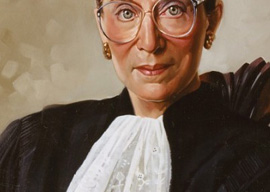
December 03, 2012

Justice Ruth Bader Ginsburg
In a solemn 2010 convocation of well-heeled feminists in Long Beach, Justice Ruth Bader Ginsburg shared her hope for an all-female Supreme Court. Although in the bad old days there were only “nine men serving on the bench,” explained Ginsburg, now with the appointment of Elena Kagan and Sonia Sotomayor, “we”re all over the bench” and that she will only be satisfied “when there are nine.”
Although each of us (at least in an alternative reality) may be allowed to have his/her/its point of view, it seems to me that our liberal activist justice left certain questions begging in her pep talk to something called the “Women’s Conference.” Would Ginsburg welcome all women as associates on the bench, or must the desired members be official women as opposed to merely empirical ones?
The difference is important. Phyllis Schlafly is a well-trained legal scholar whose political views are diametrically opposed to Ginsburg’s. Would she be acceptable as a member of the ideal female-dominated (no males need apply) Supreme Court? Or would all female members be expected to hold the same ideological positions as those of the headlined speaker, views which just happen to be those of the other female Supremes, whose presence on the bench she heartily celebrates?
This past Sunday, I caught sight of Al Sharpton on Meet the Press. He was being drooled on by, among others, The New York Times“ designated “conservative,” David Brooks. Sharpton, the ungrammatical demagogue and perpetual player of the race card, was the official black in this prearranged assembly of notables. There he sat in his full splendor happily receiving obeisance from the other guests. When the moderator during the roundtable discussion mentioned his moving experience in watching the movie Lincoln and learning about the trials of American blacks moving from slavery to their present level of equality, the participants on cue turned to Sharpton as the presumed representative of black Americans. Al played his part to perfection. Everyone on the show was immaculately PC, from Brooks to the documentary producer Ken Burns. It was Burns who set the tone with his observations about President Obama’s need to do more to combat racial inequality. “You can”t take your foot off the accelerator here,” Burns opined.